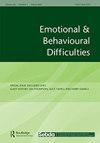屏幕背后:确定拒学主题和副主题
IF 1.5
Q3 PSYCHOLOGY, EDUCATIONAL
引用次数: 4
摘要
拒学在病因和表现上是多种多样的。其表现的异质性,本研究的重点,使拒学的概念化和评估复杂化。本研究记录了拒学的描述性模型的发展,该模型被用来为确定拒学表现的问卷(拒学评估-筛选)的发展提供信息。对42名参与者进行了半结构化访谈:表现出拒绝学业的青少年和没有表现出拒绝学业的青少年,中学专业人员和照顾表现出拒绝学业的青少年的专业人员。通过对访谈数据的分析,我们将拒学表现分为四个主要主题,包括十个类别。这四个主题是:学校、日常和家庭生活、健康以及家庭和家庭以外的社交活动。这些主题对应的各种背景下,学校拒绝可能是明显的。研究结果支持了一个普遍的观点,即拒学表现并不局限于离开学校,而且很可能发生在学校环境之外。本研究首次对法国青少年拒学表现进行实证分析。本文章由计算机程序翻译,如有差异,请以英文原文为准。
Behind the SCREEN: identifying school refusal themes and sub-themes
ABSTRACT School refusal is heterogeneous in aetiology and presentation. The heterogeneity in its presentation, the focus of this study, complicates the conceptualisation and assessment of school refusal. The present study documents the development of a descriptive model of school refusal that was used to inform the development of a questionnaire for identifying manifestations of school refusal (the SChool REfusal EvaluatioN – SCREEN). Semi-structured interviews were conducted with 42 participants: adolescents who display school refusal and those who do not, middle school professionals, and care professionals working with adolescents displaying school refusal. Analysis of interview data led to the organisation of school refusal manifestations according to four main themes comprising ten categories. The four themes were: School, Daily and Family Life, Health, and Socialisation Outside Home and Family. These themes correspond to the various contexts in which school refusal may be manifest. Results support the common notion that school refusal manifestations are not limited to absence from the school context, and are likely to occur outside this environment. This study represents the first empirical analysis of the manifestations of school refusal among French youth displaying school refusal.
求助全文
通过发布文献求助,成功后即可免费获取论文全文。
去求助
来源期刊

EMOTIONAL AND BEHAVIOURAL DIFFICULTIES
PSYCHOLOGY, EDUCATIONAL-
CiteScore
1.80
自引率
10.00%
发文量
10
期刊介绍:
The central intention of Emotional & Behavioural Difficulties (EBDs) is to contribute to readers" understanding of social, emotional and behavioural difficulties, and also their knowledge of appropriate ways of preventing and responding to EBDs, in terms of intervention and policy. The journal aims to cater for a wide audience, in response to the diverse nature of the professionals who work with and for children with EBDs.
 求助内容:
求助内容: 应助结果提醒方式:
应助结果提醒方式:


